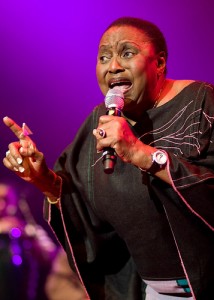Her haunting melodies gave voice to the pain of exile and dislocation which she felt for 31 long years. At the same time, her music inspired a powerful sense of hope in all of us. (Former South African president Nelson Mandela)
 I must confess that I knew so little about Miriam Makeba’s music that when I heard a CNN reporter say “legendary folk singer dies performing, stay tuned for details”, I thought he was referring to Joan Baez.
I must confess that I knew so little about Miriam Makeba’s music that when I heard a CNN reporter say “legendary folk singer dies performing, stay tuned for details”, I thought he was referring to Joan Baez.
In fact, I knew Makeba mostly from her association with two famous men, namely:
- Hugh Masekela, the South African jazz trumpeter who was her first husband and with whom she collaborated on such critically acclaimed songs as “South African Freedom Song”; and
- Stokely Carmichael (aka Kwame Ture), the controversial leader of the 1960s radical group the Black Panthers whom she later married and joined in exile in Guinea in the late 1960s after Carmichael fell out with the Panthers.
But, notwithstanding my ignorance about her music, it is noteworthy that Makeba was the first African woman to win a Grammy Award for:
… her distinctive style combining jazz with folk with South African township rhythms.
Nevertheless, the Makeba I knew was invariably hailed more for her political activism than her songs. But, given what I now know about her musical legacy, I can appreciate why South African Foreign Affairs minister Nkosazana Dlamini Zuma eulogized her as follows:
Throughout her life, Mama Makeba communicated a positive message to the world about the struggle of the people of South Africa and the certainty of victory over the dark forces of apartheid and colonialism through the art of song.
Indeed, she proved so effective in this respect that, after she starred in the anti-apartheid documentary “Come Back, Africa” in 1959, the government banned her from South Africa. And this ban was not lifted until the country’s first democratically elected president, Nelson Mandela, personally invited her to come back home 31 years later.
Makeba, “The Empress of African Song”, reportedly suffered a heart attack on Sunday night while performing one of her most famous song “Pata Pata” at a benefit concert in Southern Italy. She was 76.
But the timing of her death is symbolic in two respects, namely:
- Reports are that “Whilst this great lady was alive she would say: ‘I will sing until the last day of my life'”; and
- She died as she lived; i.e., agitating for pan African justice – as she was performing in honor of six immigrants from Ghana who were allegedly murdered in Italy last September by members of organized crime.
Farewell Mama Africa … Amandla!
Related Articles:
Makebe sings and discusses South African Freedom Song
Leave a Reply
You must be logged in to post a comment.